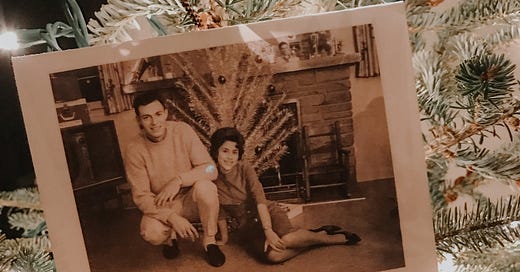I’d like to propose the revival of an old Irish tradition — Nollaigh na mBan, pronounced ‘Null-ug-na-Mon’, or Women’s Little Christmas.
My research for this month’s letter started with Auld lang Syne — the popular Scottish poem that plays as the clock strikes midnight on New Year’s Eve — then led me to Nollaigh na mBan, an old Irish tradition honoring women the following week on January 6. Which is today, dear friends, so let’s celebrate!
My inner rhythm is shifting to a more seasonally-inspired outlook, something I’ve minutely always felt within me, especially around the holiday season. It isn’t necessarily slower but is evolving in pace, value, and belief.
This past month of isolation caused by sickness has gifted me time to observe the frenetic pace of the holiday winter months. It’s deeply ingrained in the last few generations of my kith & kin, and our collective world. This year I had a reasonable excuse not to partake; mono followed by a sinus infection and then covid from Thanksgiving to New Year’s Eve – yep, that should do it!
What I discovered is something you might already know: The Twelve Days of Christmas does not end with Christmas. No, Christmas Day is the first of twelve days leading us to today, January 6. Those of you familiar with Catholicism know this as Epiphany. What this means to me, a gal looking to celebrate as much as I can in a year, is that festivities don’t have to end with a bang on Christmas Day or a hungover New Year’s. It can be a slow burn, a simmer through the beginning of January.
God rested on the seventh day but the women of Ireland didn't get to do the same until the twelfth and last day of Christmas.
— Irish Times Article, 6 January 1998
In County Cork, Ireland, today is not only Epiphany but it’s also Women’s Little Christmas. On this day, women traditionally took a much-needed rest after catering to everyone during the holiday festivities. Men of the household took care of the children and other domestic tasks while women of the community gathered for tea, cake, and a break. It’s having a revival beyond County Cork in Ireland, something akin to International Women’s Day.
It’s also the day of taking down the tree and Christmas decorations, and burning the dried branches, for taking them down before or after January 6 will bring bad luck for the rest of the year (source).
It's a custom which seems to have been passed on orally and informally, drifting down like feathers from one generation to the next. Few women spoken to for this article had read anything about Nollaig na mBan, but all had heard about it from other women or female family members - grandmothers, mothers, aunts.
— Irish Times Article, 6 January 1998
Like many female stories, traditions for Women’s Little Christmas were passed down orally from one generation to the next. While I know our female stories are often passed along verbally, especially in big moments like getting married and birthing children, I want this one written down.
As a new mother, I’ve forgotten to enjoy gathering with friends for the simple reason of holding the same space. Bring the children! but can we talk about something other than…the children? Letting them play without constant interference is highly likely to be welcomed by them as well.
While showing our children we’re working we can also show them we prioritize our leisure and friendships so they know how to mimic that too.
In my deep love for my child, the deep love for my Self has been put on the back burner on a stove that doesn’t even work, and that’s not sustainable for me or my child. The irony is that friendship is the very thing that reinforces my backbone so I can be the backbone of my household.
More importantly, it reclaims my worth for simply being me.
Photo of my Grandma & Grandpa Watz, Christmas 1962. This year’s Christmas card from my mother.





I love this tradition - can we do this next year?? 🫖🍰
What a beautiful tradition. I hope we're able to find pockets of rest for yourself. Thanks for this article.